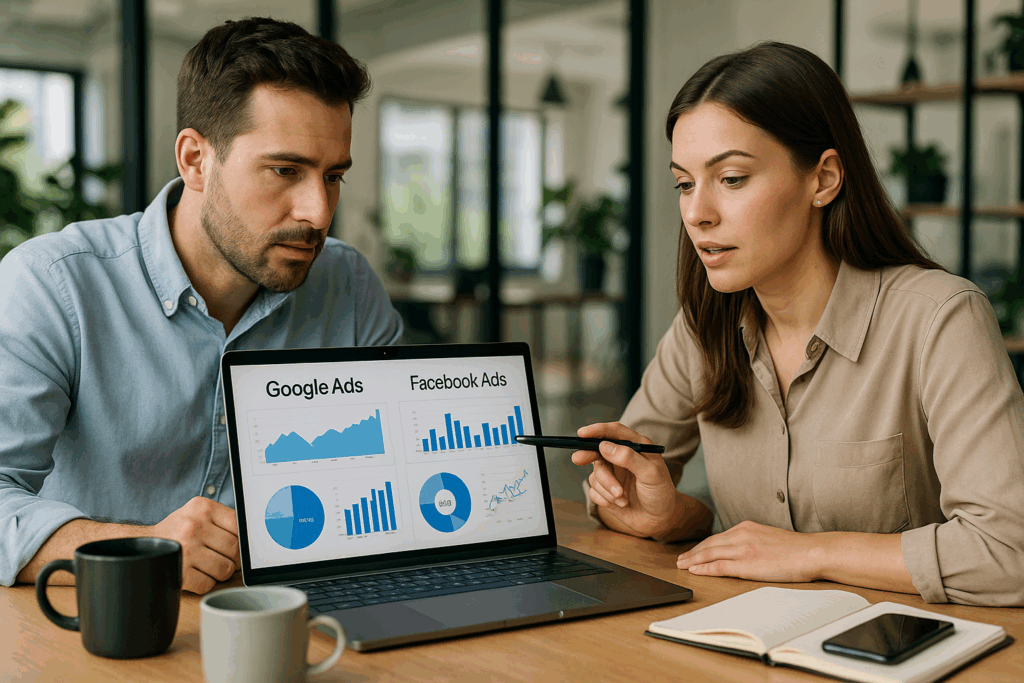If you’re a small business owner trying to figure out where to spend your advertising budget, this challenge affects thousands of businesses.
In this guide, we’ll break down Google Ads vs Facebook Ads in simple terms so you’ll know exactly which platform will deliver better results for your business and budget.
We’ll cover:
- Why Facebook Ads work better for building brand awareness
- Capture high-intent customers through Google’s search platform
- Real cost comparisons and ROI expectations
- Budget allocation strategies vs guesswork approaches
- Better lead quality and conversion rates you can expect
- How to get started without wasting money
We’ve helped small businesses across Australia choose the right paid traffic strategy using these same methods.
Read on to learn more about Google Ads vs Facebook Ads the right way.
Google Ads Brings Customers Ready to Buy
Picture this: someone types “plumber near me” at 2 am with a burst pipe flooding their kitchen. They’re not browsing for fun; they actually need help, and they’re ready to pay for it.

This real-world example demonstrates the core advantage of paid search advertising.
How Paid Search Captures High-Intent Traffic
Google Ads work because of search intent. This means when people actively search for your services, they’re already much further along in their buying journey than someone just scrolling through Facebook. That’s exactly why your keyword research strategy becomes so important.
For example, you want to target phrases that show immediate need. Think words like “emergency,” “now,” “today,” or location-specific terms. These searches signal real urgency.
Our investigation showed that PPC campaigns on Google deliver 3x better conversion rates than social media ads. The reason is straightforward. Paid search reaches customers with genuine buying intent, rather than casual browsers killing time on social media.
Ad Formats That Work for Small Budgets
To get the most out of your limited budget, you don’t need to rely on fancy video ads.
Start with search ads using exact match keywords to control costs. This tactic allows you to target only the most relevant searches, ensuring you’re not wasting money on irrelevant clicks.
Once you identify which ads convert, you can expand your campaigns gradually while still staying within your budget.
Now, let’s look at how Facebook Ads work.
Facebook Ads Build Awareness Among Your Ideal Audience
What if your ideal customers don’t know they need your services yet? That’s where Facebook Ads shine.
While Google Ads catch people actively searching, Facebook Ads introduce your brand to potential customers who haven’t started looking.
Facebook Ads operate on three main principles:
- Precision Audience Targeting: Target people based on their interests, not just keywords. Facebook knows if someone recently moved, got married, or started a business. This interest-based targeting helps you reach your ideal audience before they start searching for solutions.
- Visual Storytelling That Works: Photos and videos grab attention like text ads never could. For instance, carousel ads, customer testimonials, and behind-the-scenes content showcase your work directly in people’s feeds.
- Budget-Friendly Reach: When it comes to cost, Facebook Ads offer a major advantage. You can expect to pay $0.50-2 per click compared to Google’s $5-15 range. Those savings mean your social media marketing budget stretches much further and potentially reaches thousands more prospects.
But here’s the catch: Awareness doesn’t always equal sales, especially compared to organic traffic from search engines.
Which Platform Delivers Better Value for Your Dollar?
Google Ads typically delivers better value for small businesses, despite higher upfront costs. Here’s why the numbers favour search advertising over social media marketing.

- Lead Quality Comparison: Why do Google Ads convert better than Facebook Ads? People from Google Ads convert much better than Facebook traffic. The reason is very easy: search intent beats casual browsing every time. Your PPC campaigns should prioritise quality over quantity when comparing these platforms.
- True Cost Analysis: Facebook’s lower click costs hide the real story. While Facebook Ads cost less per click, Google’s higher conversion rates often deliver better cost per customer. So track both platforms using Google Analytics and landing page data to see actual acquisition costs for your business.
- Customer Lifetime Value: Consider the lifetime value of each customer you acquire. After all, small businesses need repeat customers, not one-time buyers. Our research found that Google ad customers typically spend more over their lifetime compared to social media leads. This makes the higher upfront investment worthwhile.
For small businesses, the priority becomes measuring real results instead of ad spend. Focus on customers gained, rather than clicks purchased.
Practical Budget Allocation Strategies That Work
Most small businesses waste money by putting all their paid traffic budget into one platform. A more strategic method is to use both Google Ads and Facebook Ads.

Follow these practical steps:
- Start with a 60/40 split: Allocate 60% to Google Ads and 40% to Facebook Ads. This captures both active searchers and potential customers who haven’t started looking yet.
- Avoid large budget launches: Never launch both platforms with big budgets simultaneously. This approach often leads to wasted ad spend and poor initial results.
- Test with smaller amounts first: Why risk hundreds of dollars? Modest budgets reveal which PPC ads perform better for your specific business before scaling up.
- Scale the winner gradually: The platform delivering better results deserves more of your budget. Increase spending on the winner while maintaining some organic traffic diversity across both channels.
Armed with this budget framework, the final step is determining which platform aligns best with your business needs.
Making the Right Choice for Your Business
Small businesses often struggle with choosing between Google Ads and Facebook Ads for their limited advertising budgets. This decision can determine your marketing success and growth trajectory. Fortunately, proven strategies exist to help you invest wisely and maximise returns.
We’ve covered how Google Ads capture high-intent searchers ready to buy, while Facebook Ads build brand awareness among potential customers. Both platforms serve different purposes in your overall paid advertising strategy.
Ready to boost your leads? Contact us today to create a customised Google Ads strategy that delivers real results for your business.
